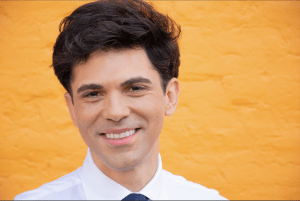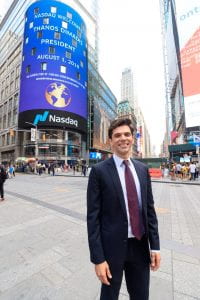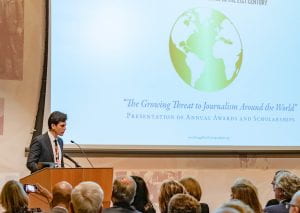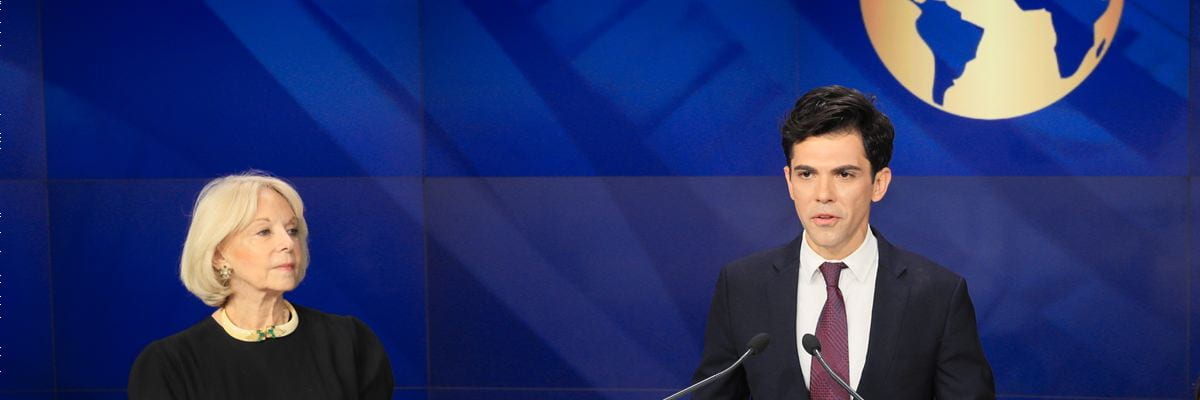Thanos Dimadis (Media and Communications, 2010) learned first-hand the risks of working as a journalist and holding political powers to account, an experience he recounts in his latest book. He gives his education at City, University of London credit for the knowledge and resilience that helped him win the fight.
 Thanos Dimadis, President of the Association of Foreign Press Correspondents in the United States, has spent much of his career advocating for journalists’ rights to pursue objective and truthful reporting. It’s therefore easy to believe him when he says his education at City, University of London has had a substantial influence on the path and success of his career.
Thanos Dimadis, President of the Association of Foreign Press Correspondents in the United States, has spent much of his career advocating for journalists’ rights to pursue objective and truthful reporting. It’s therefore easy to believe him when he says his education at City, University of London has had a substantial influence on the path and success of his career.
“My studies at City granted me a solid background in media and communications theories and gave me the tools and equipment to interpret and analyse the developments in this field in a more in-depth manner,” Thanos says, commending the academic staff who supported and challenged him to reach the high standards set by the course. “Professional experience is essential for career success, but career success is fragile without a solid academic and theoretical background established only through rigorous master programmes such as the one City offers.”
Thanos grew up in Brussels. He moved to Athens for the first time at the age of eighteen to pursue his undergraduate studies in Journalism and, afterward, receive his first master’s degree in European Law and Policy. During his studies, Thanos worked for some of the most prominent media organizations in Greece becoming the youngest journalist in the country to undertake the role of head of the political news department and manage a team of journalists at the biggest broadcast TV channel in Greece. However, Thanos had a broader vision for his life and career than staying in Athens, which led him to study at City, University of London. After graduating, Thanos moved to Washington, D.C. in the U.S. and worked as a foreign correspondent for the most prominent broadcast outlets in Greece. He secured several interviews from the U.S. government and the International Monetary Fund, created a documentary, and authored his first book on the Eurozone crisis. Reporting on the news in the U.S., he maintained the high standards he’d adopted at City.
“I have a view about journalism that is separate from my view on media,” Thanos explains. “Media are businesses while journalism is the concept of a profession that has always been crucial for transparency in our Democracies and accountability in our political systems. Journalism reflects real journalists’ work that’s created from the hard work of people who remain in the career field despite the financial uncertainty, the 24 hours non-stop alert they should be in just in case news breaks unexpectedly, and the risks they take to become the target of retaliation for reporting the truth.”
 Thanos learned first-hand the risks of independent journalism and investigative reporting when he in 2016 become the target of retaliation from a former minister in Greece and his associates in the government.
Thanos learned first-hand the risks of independent journalism and investigative reporting when he in 2016 become the target of retaliation from a former minister in Greece and his associates in the government.
“In September 2016, the former Minister of Greece who was controlling the state-owned media in the country used those media to report and spread fake news against me that the NYPD and the FBI had arrested me with criminal charges in New York due to my reporting on the Minister,” Thanos says.
He decided he had an obligation to keep the government officials who attempted to tarnish him as a journalist accountable.
“The U.S. State Department declassified documents that proved the story was a lie orchestrated by the Minister and his associates. I placed a lawsuit for defamation that condemned the Minister’s associates for fabricating that fake story against me to assassinate my reputation and integrity in my Greek people’s eyes. The Minister himself appealed to his political immunity to avoid criminal charges over my lawsuit against him.”
In 2020 Country Reports on Human Rights Practices: Greece the U.S. State Department made a special reference to Thanos “for being slandered by a former minister” and stated the journalist had proven to the court that the accusations were false and slanderous.
 As a journalist who had been targeted by the former government of his country, Thanos was invited in 2018 the Foreign Press Center of the State Department in New York to speak about the freedom of the press, and in 2019 by Nasdaq to speak to the closing bell ceremony in Times Square where he urged journalists to “not to be afraid to speak out, show resistance, and denounce publicly any attempts to shut them down.”
As a journalist who had been targeted by the former government of his country, Thanos was invited in 2018 the Foreign Press Center of the State Department in New York to speak about the freedom of the press, and in 2019 by Nasdaq to speak to the closing bell ceremony in Times Square where he urged journalists to “not to be afraid to speak out, show resistance, and denounce publicly any attempts to shut them down.”
The experience, which Thanos describes as the biggest professional challenge in his life, is also the subject of his new book A Reporting About Media and Power, published in Greece last year.
“The lesson I learned is that attacking journalists does not necessarily mean a physical attack to harm or kill them. It can also entail attacks to undermine their reputation, character, and professional status. We should not forget the power of a journalist comes from its signature. The first step to undermine a journalist is by undermining its signature – in other words, its credibility”.
In this context, Thanos mentions again the benefits his education offered him.
“Turning the clock back, I tend to believe that in big challenges and critical moments like these, the only allies someone has are their instinct and the education they received. Education makes someone strong enough to overcome challenges such as the major one I faced. Education enhances your critical thinking, amplifies your instinct, and enables you to see things through in the long term.”
 Thanos no longer works actively as a foreign correspondent, but is still very much involved in journalism and media as an adjunct lecturer at University of Florida, visiting lecturer at George Washington University, through his managerial work at the Association of Foreign Press Correspondents in the United States, and writing his third book.
Thanos no longer works actively as a foreign correspondent, but is still very much involved in journalism and media as an adjunct lecturer at University of Florida, visiting lecturer at George Washington University, through his managerial work at the Association of Foreign Press Correspondents in the United States, and writing his third book.
“Two years ago, I received a phone call from a group of foreign journalists who asked me to step in and undertake a leading role as president to build from scratch the community of foreign correspondents in America. That was a challenge requiring a deep knowledge not only of the needs of foreign journalists – which was easy for someone like me who started his career in the U.S. as a foreign correspondent – but also of business development, programs management, fundraising, and building partnerships with the private sector.”
If the false allegations against Thanos were his biggest professional challenge, he feels his work to make the Association (AFC-USA) successful is his biggest success so far.
“I count this not merely as my success but the success of a great board of directors, executive officers, and our Chairwoman Nancy Prager Kamel, who feed me with inspiration through their presence, support, and involvement every day in my work.”
With his education and experience, what does Thanos Dimadis feel is the largest threat to journalism today?
As Thanos already mentioned, media are primarily businesses and therefore need to make a profit. This makes them inclined to serve interests and agendas that go against journalistic principles.
“The rise of social media enables independent journalists to have their own voice and build their own audience, but the majority of journalists remain under the shadow of the profit-derived priorities of the media they work for. I do not believe in objective journalism as long as media run their business in a for-profit model.”
This may sound discouraging to those who work in journalism, want to become journalists, or simply believe in the importance of independent journalism, but if Thanos’ story teaches us anything, it is not to give up but to challenge the status quo:
“I believe my case serves as a reminder of what I learned during my studies at City; that journalists should always fight for truth, stick to their guts, show resilience, and be prepared to always stand up against political power. To do that, you need a lot of personal courage and strength, and in the end, it seems I have them.”
Thanos Dimadis is a member of City, University of London’s US Alumni Board.
